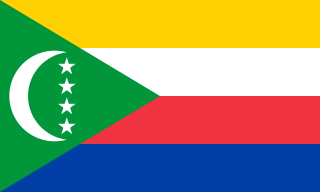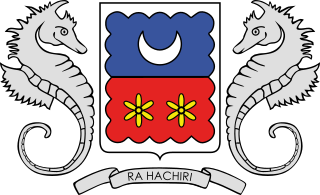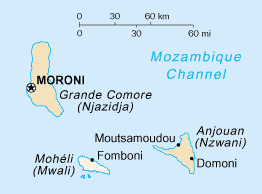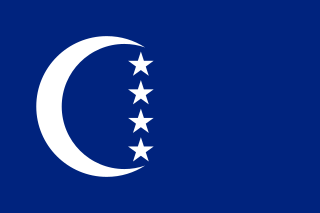Ahmed Abdou | |
|---|---|
| Born | 1936 (age 87–88) |
| Nationality | |
| Occupation | Politician |
Ahmed Abdou (born 1936) is a Comorian former politician. He was Prime Minister of Comoros from 27 December 1996 to 9 September 1997. [1]
Ahmed Abdou | |
|---|---|
| Born | 1936 (age 87–88) |
| Nationality | |
| Occupation | Politician |
Ahmed Abdou (born 1936) is a Comorian former politician. He was Prime Minister of Comoros from 27 December 1996 to 9 September 1997. [1]
Abdou served as finance minister briefly during 1972, and again from 1973 until the country received independence in 1975. He became prominent again over 20 years later when in December 1996, he was appointed Prime Minister of Comoros.
In May 1997 there was a movement to dismiss him, but he survived a parliamentary confidence vote 38–2. The government ran into serious trouble in August 1997 when two of the Comoros's islands, including Abdou's home island of Anjouan, seceded from the union [2] and Abdou was dismissed in September 1997 after 9 months in office.
In September 2014, he had been detained by the government for his alleged support and affiliation with ISIS. He was released nine years later, in April 2023.

The Comoros, officially the Union of the Comoros, is an archipelagic country made up of three islands in Southeastern Africa, located at the northern end of the Mozambique Channel in the Indian Ocean. Its capital and largest city is Moroni. The religion of the majority of the population, and the official state religion, is Sunni Islam. Comoros proclaimed its independence from France on 6 July 1975. The Comoros is the only country of the Arab League which is entirely in the Southern Hemisphere. It is a member state of the African Union, the Organisation internationale de la Francophonie, the Organisation of Islamic Co-operation, and the Indian Ocean Commission. The country has three official languages: Shikomori, French and Arabic.
The history of the Comoros extends back to about 800–1000 AD when the archipelago was first inhabited. The Comoros have been inhabited by various groups and sultanates throughout this time. France colonised the islands in the 19th century, and they became independent in 1975.

The Politics of the Union of the Comoros take place in a framework of a unitary presidential republic, whereby the President of the Comoros is both head of state and head of government, and of a multi-party system. Executive power is exercised by the government. Legislative power is vested in both the government and parliament. The precolonial legacies of the sultanates linger while the political situation in Comoros has been extremely fluid since the country's independence in 1975, subject to the volatility of coups and political insurrection.

Mayotte, officially the Department of Mayotte, is an overseas department and region and single territorial collectivity of France. It is located in the northern part of the Mozambique Channel in the Indian Ocean off the coast of Southeastern Africa, between Northwestern Madagascar and Northeastern Mozambique. Mayotte consists of a main island, Grande-Terre, a smaller island, Petite-Terre, as well as several islets around these two. Mayotte is the most prosperous territory in the Mozambique Channel, making it a major destination for immigration.

Anjouan is an autonomous volcanic island in the Comoro Islands in the southwestern Indian Ocean, part of the Union of the Comoros. It is known in Shikomori as Ndzuani, Ndzuwani or Nzwani, and, until the early twentieth century when the name fell out of general use, in English as Johanna. Historically it was also called Hinzuan or Hanzoan.

Azali Assoumani is a Comorian politician and military officer who has served as the President of the Comoros from 2002 to 2006 and again since 2016, except for a brief period in 2019. He became head of state after staging a coup d'état in 1999 and was elected president in 2002, 2016, 2019 and 2024. He also served as Chairperson of the African Union from February 2023 to February 2024.

The Comoro Islands are a group of volcanic islands in the Mozambique Channel, an arm of the Indian Ocean lying between Madagascar and the African mainland. Three of the islands form the Union of the Comoros, a sovereign nation, while Mayotte belongs to France.

Mohéli, also known as Mwali, is an autonomously-governed island that forms part of the Union of the Comoros. It is the smallest of the three major islands in the country. It is located in the Indian Ocean off the coast of Africa and it is the smallest of the four major Comoro Islands. Its capital and largest city is Fomboni.

Grande Comore is an island in Comoros off the coast of Africa. It is the largest island in the Comoros nation. Most of its population is of the Comorian ethnic group. Its population as of 2006 is about 316,600. The island's capital is Moroni, which is also the national capital. The island is made up of two shield volcanoes, with Mount Karthala being the country's highest point at 2,361 m (7,746 ft) above sea level. According to the 2009 revision of the constitution of 2002, it is governed by an elected Governor, as are the other islands, with the federal government being much reduced in power. The name Ngazidja is sometimes seen in the now nonstandard form Njazidja.
Colonel Mohamed Bacar is a Comorian former politician who was President of Anjouan, one of the three autonomous islands that make up the Union of the Comoros, from 2001 to 2008. He is a former chief of police on Anjouan and has studied extensively in France and the United States. He was part of a military coup on Anjouan in August 2001 and soon became president. It is alleged he rigged the elections to become the first president of Anjouan in March 2002, in part due to his leading role in the separatist movement. He was ousted by the combined forces of the Government of the Union of Comoros and the African Union in the March 2008 invasion of Anjouan.
![<span class="mw-page-title-main">Hamada Madi</span> Former Prime Minister of the Comoros [2000-2002] and interim president](https://upload.wikimedia.org/wikipedia/commons/7/77/Hamada_Madi_2018.jpg)
Hamada Madi, widely known as "Boléro", is a Comorian politician, former Prime Minister and interim President. He was Secretary General of the Indian Ocean Commission between 2016 and 2020.

Presidential elections were held in the Comoros on 16 April and 14 May 2006. As it was the turn of the island of Anjouan to hold the union presidency, a primary election was held in Anjouan on 16 April, prior to a national election on 14 May. The result was a victory for Ahmed Abdallah Mohamed Sambi, who received 58% of the vote in the national election.
Ibrahim Halidi was a long-time politician in Comoros. Halidi was the Prime Minister of Comoros from January to May 1993. Halidi also ran for president in May 2006 with the backing of the outgoing president, Azali Assoumani. In the first round of the election, Halidi finished in third place with 10.37% and qualified for the presidential second round, which was held on 14 May. Halidi lost the presidential election to Ahmed Abdallah Sambi. Ibrahim Halidi was supported by the Islands' Fraternity and Unity Party (CHUMA), Convention for the Renewal of the Comoros (CRC), Movement for the Comoros (MPC) and the Djawabu Party (DJAWABU).

The President of Anjouan is the head of Anjouan, one of the three islands of the Union of Comoros. The position was firstly established in 1997 after the Declaration of independence of Anjouan. Secondly the position became President of the autonomous island of Anjouan following the adoption of the Union of Comoros Constitution of 2001.

The invasion of Anjouan, on March 25, 2008, was an amphibious assault led by the Comoros, backed by African Union (AU) forces, including troops from Sudan, Tanzania, Senegal, along with logistical support from Libya and France. The objective of the invasion was to topple Colonel Mohamed Bacar's leadership in Anjouan, an island in the Union of Comoros, when he refused to step down after a disputed 2007 election, in defiance of the federal government and the AU. The Comoros archipelago in the Indian Ocean has had a fractious history since its independence from France in 1975, experiencing more than 20 coups or attempted coups.

Presidential elections were held in Anjouan on 15 June and 29 June 2008 following the 2008 invasion of Anjouan to oust Mohamed Bacar as President of Anjouan. The election was won by Moussa Toybou, who defeated Mohamed Djaanfari in the second round.

Presidential elections were held in the Comoros on 7 November 2010, with a second round on 26 December, alongside gubernatorial elections for the three main islands. The result was a victory for Ikililou Dhoinine, who received 61% of the vote.

Ikililou Dhoinine is a Comorian politician who was the President of the Comoros from 2011 to 2016; he was a Vice-President of Comoros from 2006 to 2011.

China–Comoros relations refers to the current and historical relationship between China and the Comoros. China has an embassy in Moroni and the Comoros has an embassy in Beijing. Relations were established by Comorian President Ali Soilih on 13 November 1975 and have been described as "friendly and cooperative". On 2 September of 2024, they decided to upgrade their relationship to "Strategic Partnership".
Abdou Salami Abdou is a politician from Comoros who is serving as the President of Anjouan from 23 May 2016. In 2018, he was placed under house arrest as he was discovered to be giving money and arms to insurgents.